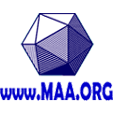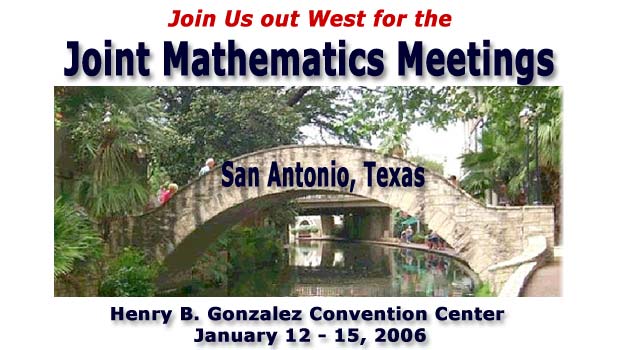
![]() CLICK
HERE TO SEARCH
THIS MEETING SITE ONLY.
CLICK
HERE TO SEARCH
THIS MEETING SITE ONLY.
Read Highlights Here
Eisenbud to Deliver Retiring Presidential Address
David Eisenbud received his PhD in 1970 at the University of Chicago under Saunders Mac Lane and Chris Robson. He was on the faculty at Brandeis University unitl he took his current position at Berkeley in 1997. He has been a visiting professor at Harvard, in Bonn and in Paris. Eisenbud's mathematical interests have ranged over commutative and non-commutative algebra, algebraic geometry, topology, and computer methods. Eisenbud has been Director of the Mathematical Sciences Research Institute since 1997. He served as President of the AMS in 2003 and 2004. He is a Director of Math for America, a foundation devoted to improving mathematics teaching. He has been a member of the Board of Mathematical Sciences and their Applications of the National Research Council, and a member of the US National Committee of the International Mathematical Union. Eisenbud currently serves on the editorial boards of the Annals of Mathematics, the Bulletin du Societe Mathematique de France, and Springer-Verlag's book series Algorithms and Computation in Mathematics. Eisenbud's interests outside of mathematics include juggling (he is co-author of a paper on the mathematics thereof), photography and, above all, music. He currently spends most of his musical time singing Bach, Schubert, Schumann and Brahms. Devlin to Speak on The Mathematics of Everyday Language
Dr. Keith Devlin is Executive Director of Stanford University's Center for the Study of Language and Information, a co-founder of Stanford's Media X program, and a Consulting Professor of Mathematics at Stanford. He is the author of twenty-five books, one interactive book on CD-ROM and over seventy published research articles. He is Fellow of the American Association for the Advancement of Science, a World Economic Forum Fellow, and a former member of the Mathematical Sciences Education Board. He is a regular contributor to NPR's popular magazine program Weekend Edition (where he is known as "the Math Guy") and a frequent contributor to various other local and national radio programs, commenting on advances in mathematics and computing. He writes a monthly column, "Devlin's Angle," on the web journal MAA Online. His most recent books are The Math Instinct: Why You're a Mathematical
Genius (along with Lobsters, Birds, Cats, and Dogs), Thunder's Mouth
Press (2005) and The Millennium Problems: The Seven Greatest Unsolved
Mathematical Puzzles of Our Time, Basic Books (2002). Lenstra to Deliver Colloquium Lectures
Hendrik W. Lenstra Jr received his Ph.D. in mathematics from the
Universiteit van Amsterdam in 1977. He was a full professor at Amsterdam
from 1978 until 1986, at Berkeley from 1987 until 2003, and since
1998 at the Universiteit Leiden in the Netherlands. Fisher to Speak on Mathematicians and Education Reform: A Cautionary Tale
Naomi Fisher earned her B.A. in Mathematics from Connecticut College for Women (now Connecticut College), her M.A. in Mathematics from the University of Wisconsin, Madison, and her Ph.D. in Mathematics Education from Northwestern University. She is the Director of the Mathematicians and Education Reform (MER) Forum, the Coordinator of the Chicago Symposium Series on Excellence in Teaching Mathematics and Science: Research and Practice, and Adjunct Professor of Mathematics at the University of Illinois at Chicago. Fisher's work in the mathematics community has focused on how mathematicians
may effectively contribute to the educational enterprise at all
levels, K-12, undergraduate, and graduate, and how mathematics departments
may strengthen their undergraduate programs. Her work in helping
to build inter-disciplinary forums include programs for mathematicians
and mathematics educators, and programs for scientists, mathematicians,
and educators. Fisher's teaching has focused on teaching K-12 teachers,
especially in helping teachers to increase the role of geometry
in the school curriculum. As a founding member of the Park City
Mathematics Institute (formerly the Regional Geometry Institute),
she was the Director of the High School Teaching Program. She teaches
in the SESAME program for middle grade teachers at the University
of Chicago. As part of the Chicago Public Schools Algebra Initiative,
she teaches K-8 teachers to prepare to teach a rigorous Algebra
course for 8th grade students in Chicago. Fisher is the Co-Editor
of the MER Newsletter and has edited several volumes of the CBMS
Series on Issues in Mathematics Education. She was the 1993 recipient
of AWM's Louise Hay Award for Contributions to Mathematics Education. Savageau to Deliver Gibbs Lecture
Michael Savageau received a B.S. degree from the University of Minnesota in 1962, a Ph.D. from Stanford University in 1967 working in the interdisciplinary area of cell physiology and systems science, and, after postdoctoral work at UCLA and Stanford, joined the University of Michigan faculty in 1970. He was Chair of the Department of Microbiology and Immunology from 1992-2002. He initiated the interdisciplinary training program in Cellular Biotechnology in 1989 and Michigan's interdisciplinary Bioinformatics Program in 1998. He was named the Nicolas Rashevsky Distinguished University Professor in 2002. In 2003 he moved to the University of California, Davis, in the Department of Biomedical Engineering and in the Microbiology Graduate Group. He is currently Distinguished Professor and Chair of Biomedical Engineering. He has been a visiting professor at the Max-Planck-Institut für Biophysikalische Chemie, Göttingen, Germany (1976-77), The John Curtin School of Medical Research, The Australian National University, Canberra, Australia (1983-84), the University of Arizona (1993-94), and the Institut des Hautes Études Scientifiques, Bures-sur-Yvette, France (2002-03). His honors include Guggenheim Fellow, Fulbright Senior Research Fellow, Michigan Society of Fellows, Foundation for Microbiology Lecturer, American Association for the Advancement of Science Fellow, the University of Michigan Harold R. Johnson Diversity Service Award, Moore Distinguished Scholar at the California Institute of Technology, and Institute of Medicine of the National Academies of Science. He served as Editor-in-Chief of Mathematical Biosciences from 1995 to 2005. He also has served on several editorial boards, on the board of directors of the Society for Mathematical Biology and the International Federation of Nonlinear Analysts, and on National Institutes of Health, National Science Foundation, Howard Hughes Medical Institute, and the National Academies of Science advisory panels. His research is focused on mathematical methods for the comparative analysis of function, design and evolution of gene circuitry. He has published two books and more than 140 scientific articles and has lectured extensively in the US and abroad. Su to Speak on Preference Sets, Graphs, and Voting in Agreeable Societies
Francis Edward Su earned his B.S. in Mathematics from the University of Texas at Austin and his Ph.D. from Harvard. He is an associate professor at Harvey Mudd College, and has held visiting positions at Cornell and MSRI. His recent research focuses on problems in topological and geometric combinatorics, especially those that have applications to the social sciences, and he has co-authored many papers with undergraduates. He has a passion for teaching and popularizing mathematics. In 2001 he received the Merten M. Hasse Prize from the MAA for expository writing, and in 2004 he received the MAA's Henry L. Alder Award for distinguished teaching. Su serves on the Editorial Board of Math Horizons, and in his spare time he enjoys working on his "Math Fun Facts" website. His other hobbies include songwriting, theology, and outdoor activities. Jitomirskaya to Speak on Spectral Properties of Quasiperiodic Operators
Svetlana Jitomirskaya received her BS/MS
(1987) and PhD (1991) from the Moscow State University. She is now
a full professor at UC Irvine, where she has worked since 1991,
starting as a part-time lecturer. While already a permanent faculty
at UCI she had held a nine month visiting position at Caltech and
a three month position at MSRI. Her research She received the Sloan fellowship in 1996,
UCI Distinguished mid-career award for research in 2004 and AMS
Ruth Lyttle Satter prize in 2005. She was a speaker at ICM 2002
and will deliver a plenary address at ICMP 2006. 112th Annual
Meeting of the 89th Meeting
of the
Mathematical Association of America (MAA) We are pleased to acknowledge the following sponsors of this meeting:
|
|
Book your airline ticket with Delta, the official airline of the meeting! |
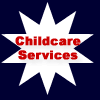
Read all about it and register!
Deadline extended to January 5!
| Videotaping: The videotaping of any Joint Mathematics Meetings sponsored events, including but not limited to special sessions, contributed paper sessions, workshops, mini-courses, short- courses and colloquia, is strictly forbidden without the explicit written permission of the Director of Meetings and Conferences for the Joint Meetings. |
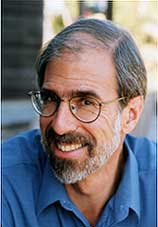 The
AMS Retiring Presidential Address will be delivered by David
Eisenbud, Mathematical Sciences Research Institute, on Friday,
January 13, 2006 from 3:20 p.m. to 4:10 p.m. He will speak on Threads
from My Life: Linear (good) Resolutions and Small (seductive) Varieties.
The lecture will be held in Ballroom C (third level), Convention
Center.
The
AMS Retiring Presidential Address will be delivered by David
Eisenbud, Mathematical Sciences Research Institute, on Friday,
January 13, 2006 from 3:20 p.m. to 4:10 p.m. He will speak on Threads
from My Life: Linear (good) Resolutions and Small (seductive) Varieties.
The lecture will be held in Ballroom C (third level), Convention
Center. 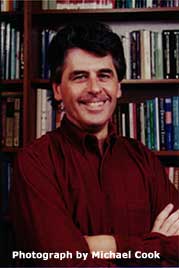 Keith
J. Devlin, Center for the Study of Language and Information,
Stanford University, will deliver an MAA Invited Address on Friday,
January 13, 2006 from 10:05 a.m. to 10:55 a.m.. He will speak on
The mathematics of everyday language. The lecture
will be held in Ballroom C (third level), Convention Center.
Keith
J. Devlin, Center for the Study of Language and Information,
Stanford University, will deliver an MAA Invited Address on Friday,
January 13, 2006 from 10:05 a.m. to 10:55 a.m.. He will speak on
The mathematics of everyday language. The lecture
will be held in Ballroom C (third level), Convention Center. 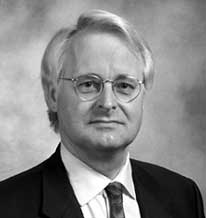 The
AMS Colloquium Lectures will be delivered by Hendrik W. Lenstra
Jr., Universiteit Leiden, on Thursday, January 12, 2006 –
Saturday, January 14, 2006 from 1:00 p.m. to 2:00 p.m. He will speak
on Entangled radicals. The lectures
will be held in Ballroom C (third level), Convention Center.
The
AMS Colloquium Lectures will be delivered by Hendrik W. Lenstra
Jr., Universiteit Leiden, on Thursday, January 12, 2006 –
Saturday, January 14, 2006 from 1:00 p.m. to 2:00 p.m. He will speak
on Entangled radicals. The lectures
will be held in Ballroom C (third level), Convention Center.  Naomi
Fisher, University of Illinois at Chicago, will deliver an MAA
Invited Address on Sunday, January 15, 2006 from 9:00 a.m. to 9:50
a.m. She will speak on Mathematicians and education reform:
A cautionary tale. The lecture will be held in Ballroom
C (third level), Convention Center.
Naomi
Fisher, University of Illinois at Chicago, will deliver an MAA
Invited Address on Sunday, January 15, 2006 from 9:00 a.m. to 9:50
a.m. She will speak on Mathematicians and education reform:
A cautionary tale. The lecture will be held in Ballroom
C (third level), Convention Center. 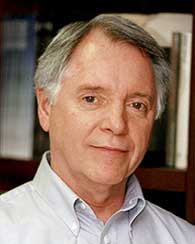 Michael
Savageau, University of California Davis, will deliver
the AMS Josiah Willard Gibbs Lecture on Thursday, January 12, 2006
from 8:30 p.m. to 9:30 p.m. He will speak on Function,
Design and Evolution of Gene Circuitry. The lecture will
be held in Ballroom C (third level), Convention Center.
Michael
Savageau, University of California Davis, will deliver
the AMS Josiah Willard Gibbs Lecture on Thursday, January 12, 2006
from 8:30 p.m. to 9:30 p.m. He will speak on Function,
Design and Evolution of Gene Circuitry. The lecture will
be held in Ballroom C (third level), Convention Center. 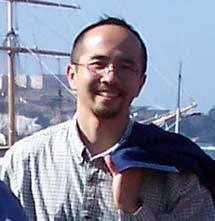 Francis
Edward Su, Harvey Mudd College, will deliver an MAA Invited
Address on Thursday, January 12, 2006 from 2:15 p.m. to 3:05 p.m.
He will speak on Preference sets, graphs, and voting in agreeable
societies. The lecture will be held in Ballroom C (third
level), Convention Center.
Francis
Edward Su, Harvey Mudd College, will deliver an MAA Invited
Address on Thursday, January 12, 2006 from 2:15 p.m. to 3:05 p.m.
He will speak on Preference sets, graphs, and voting in agreeable
societies. The lecture will be held in Ballroom C (third
level), Convention Center. 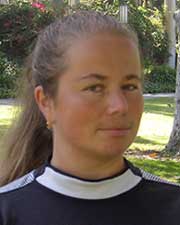 Svetlana
Jitomirskaya, University of California Irvine,
will deliver an AMS-MAA Joint Invited Address on Saturday, January
14, 2006 from 11:10 a.m. to 12:00 p.m. She will speak on Spectral
properties of quasiperiodic operators: the competition between order
and chaos. The lecture will be held in Ballroom C (third
level), Convention Center.
Svetlana
Jitomirskaya, University of California Irvine,
will deliver an AMS-MAA Joint Invited Address on Saturday, January
14, 2006 from 11:10 a.m. to 12:00 p.m. She will speak on Spectral
properties of quasiperiodic operators: the competition between order
and chaos. The lecture will be held in Ballroom C (third
level), Convention Center.
